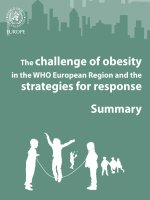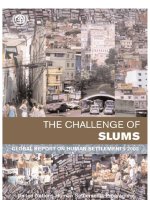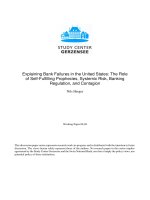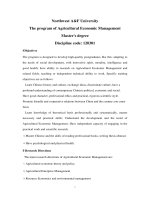- Trang chủ >>
- Khoa Học Tự Nhiên >>
- Vật lý
rebuilding war-torn states the challenge of post-conflict economic reconstruction nov 2008
Bạn đang xem bản rút gọn của tài liệu. Xem và tải ngay bản đầy đủ của tài liệu tại đây (2.84 MB, 459 trang )
Rebuilding War-Torn States
This page intentionally left blank
Rebuilding
War-Torn States
The Challenge of Post-Conflict
Economic Reconstruction
Graciana del Castillo
Columbia University
Foreword by Edmund S. Phelps
Columbia University. Winner of the 2006 Nobel Prize in Economics
1
3
Great Clarendon Street, Oxford 2 6
Oxford University Press is a department of the University of Oxford.
It furthers the University’s objective of excellence in research, scholarship,
and education by publishing worldwide in
Oxford New York
Auckland Cape Town Dar es Salaam Hong Kong Karachi
Kuala Lumpur Madrid Melbourne Mexico City Nairobi
New Delhi Shanghai Taipei Toronto
With offices in
Argentina Austria Brazil Chile Czech Republic France Greece
Guatemala Hungary Italy Japan Poland Portugal Singapore
South Korea Switzerland Thailand Turkey Ukraine Vietnam
Oxford is a registered trade mark of Oxford University Press
in the UK and in certain other countries
Published in the United States
by Oxford University Press Inc., New York
© Graciana del Castillo 2008
Themoralrightsoftheauthorhavebeenasserted
Database right Oxford University Press (maker)
First published 2008
All rights reserved. No part of this publication may be reproduced,
stored in a retrieval system, or transmitted, in any form or by any means,
without the prior permission in writing of Oxford University Press,
or as expressly permitted by law, or under terms agreed with the appropriate
reprographics rights organization. Enquiries concerning reproduction
outside the scope of the above should be sent to the Rights Department,
Oxford University Press, at the address above
You must not circulate this book in any other binding or cover
and you must impose the same condition on any acquirer
British Library Cataloguing in Publication Data
Data available
Library of Congress Cataloging in Publication Data
Castillo, Graciana del.
Rebuilding war-torn states : the challenge of post-conflict economic
reconstruction / Graciana del Castillo.
p. cm.
ISBN 978–0–19–923773–9
1. Postwar reconstruction—Case studies. 2. Peace—Economic
aspects—Case studies. I. Title.
HV639.C37 2008
338.9–dc22 2008022388
Typeset by SPI Publisher Services, Pondicherry, India
Printed in Great Britain
on acid-free paper by
Antony Rowe Ltd., Chippenham, Wiltshire
ISBN 978–0–19–923773–9
10987654321
To Nico,
for his unflappable support over 40 years
This page intentionally left blank
FOREWORD
by Edmund S. Phelps
∗
A wave of civil war and cross-border conflict has swept over numerous coun-
tries in the past two decades: Afghanistan, Kosovo, El Salvador, Iraq, and
others in Africa and Asia. It could have been expected that, when the conflict
stopped, these countries would have found their footing again and set about to
make up the lost ground. In fact, economic development has still not restarted
in most of these war-torn countries. Many of them have regressed to a lower
stage of development than they had attained before their conflicts. This state
of affairs presents dangers to the rest of the world but it must be understood
before it can be addressed with any prospect of success.
That the post-conflict countries, generally speaking, have not yet returned
to visible development might be seen by some as an indication that these
countries are permanently resistant to development—or have become so as
a result of their conflicts. We know, however, that development has proved
widely possible in spite of difficulties: on every continent we find countries
that had overcome enough hurdles for development to have begun. Indeed,
some of the war-torn countries had shown some development prior to their
conflicts. Rather than jump to the conclusion that most war-torn countries
are barren of development possibilities, we might better look to see whether
development has not resumed because some key preconditions for develop-
ment have not been satisfied.
It could well be that governmental efforts at “reconstruction” in the war-
torn countries have failed to address and even to identify some preconditions
that have been missing in the aftermath of the conflicts. It is inevitable that
governments will not get right all the conditions that a resumption of devel-
opment would require. Reconstruction aid might be shaped by a conceptual
framework for thinking about development and that framework is inadequate
to the task—in all less-developed countries and particularly in the war-torn
countries.
The classical theory of development has undoubtedly been influential in
shaping reconstruction aid, in part because of its outstanding simplicity. In
this theory, development will self-start in a country once it undertakes the
task of establishing property rights and the more difficult task of establishing
∗
McVickar Professor of Political Economy and Director of the Center on Capitalism and Society,
Columbia University. Winner of the 2006 Nobel Prize in Economics.
viii FOREWORD
the rule of law, which the economy’s participants can depend on. Then private
interests can safely form enterprises and invest in the kinds of business for
whichtheyarebestsuited.Bydoingso,theywillearnalivingaccordingto
their human capital and the amount of land and other resources available to
them.
Unfortunately, the classical perspective on development does not fully com-
prehend the richness of what development is—or could be. In the classical
theory, leisure is better than work. Passive consuming is the final purpose of
economic life. In any adequate view of what a rich development means, there
is far more to development than that.
To set up a well-aimed reconstruction program it is necessary to have in
mind a clear idea of what a rich development is and what it requires. The
central elements in any such conception of development include mental stim-
ulation, work to become engaged in, personal growth from meeting opportu-
nities and challenges, the excitement of the new and the tingle of uncertainty.
In my terminology, this means an economic dynamism—an economy of inno-
vativeness in directions believed to be profitable. Of course, economic justice
requires ample inclusion in this sort of economy. Obviously, these elements
are fundamentally foreign to the classical conception of development.
Such development, it may be argued, requires what the Scottish Enlight-
enment called a “commercial society.” Thus, real development requires a
country to create market institutions and a market culture in which business
firms may safely function as well as a supply of conventional infrastructure
and public services. As a result, the classical perspective, to the extent it is
influential, focuses reconstruction efforts on a woefully narrow subset of the
preconditions needed for development to start or restart. The baleful influence
of classical thinking could be a large part of the explanation why economic
assistance has not been directed toward the reactivation of legitimate business
enterprise, with its attendant investment projects, job creation, and increases
in productivity—and why little progress toward these goals has been seen.
Carrying out an effective reconstruction program to hasten the restart of
such a rich development is a challenge, of course. There is no cookbook with
recipes for all the institutions and cultures that serve to build an enterprising
economy. In deciding on institutions and mores it will not do to look at other
economies to infer what would work well or badly in a given country: copying
institutions and cultures from countries at very different levels of development
or different contexts is particularly risky. The idea of Rational Institutions—
that a country can be depended on to choose the right institutions simply by
virtue of its rationality and careful observation of other countries—is seriously
mistaken. As the Enlightenment’s David Hume would have said, choosing the
right institutions requires “imagination.”
Besides its shortcomings, the classical doctrine is pernicious. It proscribes
some kinds of programs that may be sorely needed. The idea promoted by
FOREWORD ix
some multilateral and bilateral donors that the war-torn countries can afford
to follow laissez-faire policies—that in these countries unfettered markets
work best and only the advanced countries need the paraphernalia of subsi-
dies, licenses, regulations, corrective taxes, and so forth—is a costly ideology.
In a war-torn country where the economy has been devastated and may not
bear the fruits of centuries of experimentation and diversification, there may
be a need for judicious and well-designed departures from laissez-faire—just
as the United States in the early years of the republic adopted some of the
infant industry ideas of Alexander Hamilton. Prohibitions against any and all
interventions in the market place in a country whose institutions and culture
have been destabilized seems dogmatic and injudicious.
In her insightful and timely book Rebuilding War-Torn States,Graciana
del Castillo understands that reconstruction in the war-torn countries must
aim toward a commercial society. She points to the failures of most of these
countries, ranging from Afghanistan to Iraq and Kosovo, to create adequate
job opportunities for the population, particularly for the younger population,
which constitutes a large part of the labor force in these countries. Inclusion,
integration, jobs, and the dynamism that helps to realize these qualities: these
ought to be the quest of the war-torn countries, del Castillo implies, just as
they ought to be the quest of the economically advanced countries.
A vicious circle has followed in the war-torn countries. Lack of productive
alternatives has driven farmers in post-conflict countries to grow illicit crops
and has led others in these countries to engage in all kinds of illegal activities.
The resulting lack of adequate jobs has contributed to public insecurity; it has
also been a major factor in the tendency of these countries to revert to war.
These results have in turn weakened the already slender incentives to restart
normal business activities in farms and towns.
The author understands also that the nature of economic aid from the
advanced economies of the West has much to do with the plight of the war-
torn nations. She notes that there is no lack of Western aid and assistance
going to these countries. There has been humanitarian aid, which serves
to support life and provide minimum levels of consumption. But it does
nothing to promote the survivors’ development. There has also been much
“reconstruction aid” channeled with the aim of creating conditions for subse-
quent redevelopment. But there are evidently deficiencies of understanding—
and misunderstandings—of what reconstruction must do in these war-torn
countries. Reconstruction aid has not been directed toward the reactivation
of legitimate business enterprise and thus creation of jobs and increases in
productivity.
The author understands too that some departures from laissez-faire are
acutely needed in the war-torn nations. On the evidence of these countries,
del Castillo argues that effective reconstruction, besides establishing the usual
preconditions for development, needs to carry out a number of activities to
x FOREWORD
reintegrate into the productive activities of the business sector an array of
former combatants, returnees, displaced persons, and other groups dislocated
by the conflict. The economic, financial, and operational challenges of carry-
ing out those activities are particularly difficult amid the democratization and
the institution of the rule of law that must take place simultaneously and that
impose a variety of constraints on reconstruction.
The book recognizes that one of the challenges of reconstruction is the
difficulty of reactivating investment in the presence of uncertainty about prop-
erty rights. Such uncertainty is always present in countries coming out of war
where governments may lack legitimacy to solve long-standing conflicts with
regard to property rights, or to establish property rights going forward, since
investors will fear that these may change as a legitimate government takes over.
At the same time, establishing law and order is particularly difficult in these
countries where “spoilers,” who benefited from illicit activities during the war,
makeeverypossibleeffort to restore unlawfulness.
On the basis of case studies and other relevant experiences, the author
presents the basic premises, lessons, best practices, and policy guidelines which
she posits are necessary to design an effective strategy for post-conflict eco-
nomic reconstruction. In her view, unless jobs are created and the political
and security objectives are assured, rebuilding war-torn states will not succeed
and peace will be ephemeral.
New York
April 2008
ACKNOWLEDGMENTS
When I started working on Rebuilding War-Torn States, I did not realize that
I would be addressing issues on which I have worked at different times in my
professional career spanning a quarter of a century. Policymaking in countries
coming out of war in the post-Cold War period is not unlike policymaking
in developing countries coming out of other crises, as for example, financial
crises in Latin American and elsewhere, where I have done much work. From
my privileged position in the Office of the Secretary-General at the UN in
the early 1990s, and later at the IMF and at Standard & Poor’s, I have met
with Presidents, Prime and Foreign Ministers, Ministers of Finance, and Pres-
idents or Governors of Central Banks. With the Secretary-General, I also had
the opportunity to meet with his Special Representatives in many countries
coming out of war. I am grateful to all of them for meetings in which their
frankness and the thoroughness with which they discussed their views allowed
me to better understand and think of solutions to the many problems and
challenges of countries in and out of crises.
As a trained economist, I am deeply indebted to Nobel Laureates Robert
A. Mundell and Edmund S. Phelps for getting me involved in international
economics and macroeconomics when I was a Ph.D. student at Columbia
University. I was fortunate not only to have them as teachers and advisers but
also for the opportunity to work with them on several projects over the years.
I am particularly grateful for the privilege of their long-standing friendship, as
I am for that of Viviana Phelps.
As an aspiring political scientist, my first exposure to the political world was
in Boutros-Ghali’s office as the first economist in the Cabinet. I am grateful
to him, as I am to his deputies, particularly Alvaro de Soto and Marrack
Goulding, for all I learned from them. I am also indebted to Enrique ter Horst,
who recruited me to the Director-General’s office, where I was fortunate to
work with him and the Director-General Antoine Blanca in interesting issues
including Iraq in the aftermath of the Gulf War and the Commonwealth of
Independent States after the fall of the Berlin Wall. Although I was always
aware of the political constraints on economic policymaking, my years at
the Secretary-General’s office and previously at the office of the Director-
General were an eye-opening experience on how ignoring such constraints
often meant going back to war or chaos. I also learnt about the economic
consequences of peace and how costly failure at post-conflict economic recon-
struction was—not only in terms of human lives but also in terms of huge
military and peacekeeping expenses if the countries reverted to war.
xii ACKNOWLEDGMENTS
My experiences at both the UN and the IMF were invaluable in writing
this book and William McDonough was instrumental in my move from one
to the other. I am grateful to him for an old friendship (dating back to the
period before he became President of the New York Fed), for most interesting
discussions, and for his support over the years.
There is nothing in my professional work of the last decades that I have
not discussed with two of the most talented people I know: Mario Blejer
and Alvaro de Soto. As a former President of the Central Bank of Argentina
and Director of the Centre for Central Banking Studies of the Bank of
England, and with broad experience at the IMF and in academia, Mario’s
views on economic matters are always important to me. As a main political
adviser to three secretary-generals at the UN, more recently with rank of
Under-Secretary-General, Alvaro was the one who introduced me to work in
post-conflict countries, for which I am eternally grateful. I have cherished co-
authoring important work with both of them and being Mario’s partner at
Macroeconomic Advisory Group. Alvaro and Mario have been, and continue
to be, not only an inspiration but a source of unreserved friendship.
Other colleagues, students, and friends with whom I have had fruitful
discussions over the years have influenced my views in Rebuilding War-Torn
States in many and different ways and I have learned enormously from their
work and writings. These include (alphabetically) Margaret Joan Anstee,
Blanca Antonini, Katherine Baer, Ana Mercedes Botero, Camilla Bustani, Lisa
Buttenheim, Lakhdar Brahimi, Luis Carranza, Warren Coats, Enzo Croce,
Mercedes da Costa, Juan Carlos Di Tata, Jolly Dixon, Michael Doyle, Sebastian
Edwards, Charles Frank, José Gil Díaj, Javier Guzmán, Peter Hansen, Barry
Herman, Richard Jolly, Eliot Kalter, Angela Kane, Mohsin Khan, Bernard
Kouchner, Nina Lahoud, Alfonso López, Alejandro López-Mejía, Claudio
Loser, Pedro Malan, Roger Manring, Marcilio Marques Moreira, Bernard
Miyet, Diana Negroponte, José-Antonio Ocampo, Cristián Ossa, Augusto
Ramírez-Ocampo, Carmen Reinhart, Gert Rosenthal, Silvia Sagari, Karl
Sauvant, Andrés Solimano, Jim Sutterlin, Steven Symansky, Vito Tanzi, Cecilia
Todesca-Bocca, Luis Valdivieso, Andrés Velasco, Francesc Vendrell, Tom Weiss.
It is impossible for me to acknowledge all the important influences on
my work from my experience in El Salvador—which remains the most suc-
cessful experience with post-conflict economic reconstruction—but I want to
thank in particular, President Cristiani and his successor President Calderón,
Ricardo Castaneda, Roberto Orellana, Nidia Diaz, David Escobar Galindo,
Ana Maria Guadalupe, Mirna de Liévano, Salvador Samayoa, Oscar Santa-
maría, Mauricio Vargas, and Rubén Zamora.
I am also indebted to the late Sidney Dell and Goran Ohlin, who influenced
my earlier work at the UN, and to Sergio Vieira de Mello and Nadia Younes
who taught me so much about Kosovo and who tragically died in the attack
on the UN in Baghdad in 2003.
ACKNOWLEDGMENTS xiii
A number of conferences I have attended in the last two years have allowed
me to discuss different parts of the volume with different audiences and I am
grateful to them for their views and feedback. It has also allowed me to discuss
recent work that they have produced and that is relevant to my own. Although
a complete list of acknowledgements would be too long, I want to mention my
good fortune in being able to discuss the findings of the Independe nt Inquiry
Committee on the UN’s oil-for-food program with Paul Volcker and the cur-
rency exchange in Afghanistan and Iraq described in Global Financial Warriors
with John Taylor in Siena. I also enjoyed the opportunity to discuss post-
conflict economic reconstruction with Tony Addison in Bellagio and with a
number of experts and policymakers from countries in the transition to peace
in the U.S., Canada, and Europe to learn from their inside perspectives. I also
want to mention my gratitude to Roman Frydman and Andrzej Rapaczynski,
the Directors of Project Syndicate, through which my work on post-conflict
economic reconstruction (one with Edmund Phelps) was published in over
fifty top newspapers across the world.
I used an earlier draft of the book to teach a course at Columbia University,
School of International and Public Affairs (SIPA) in the Fall of 2007. I am
grateful to my students for questioning every aspect of my arguments and for
interesting suggestions based on their own experiences.
I am always grateful to Jacob Frenkel, a former chief economist of the
IMF and President of the Central Bank of Israel and now Vice-Chairman of
AIG, and Onno Wijnholds, formerly at the Board of the IMF and now the
Representative of the European Bank in Washington, for frequent discussions
on economic and financial issues and for their encouragement and support
throughout the writing process. I have also greatly benefited from detailed
comments by Barnett Rubin, Antonio Donini, Gerard Fischer, Susan Wood-
ward, Frank Randall, Felipe Paolillo, and Kristen Boon. My profuse thanks
go to Professor Laura Randall, who introduced me to economics and who
generously went through an earlier version of the book, making not only
substantive comments but editorial suggestions which have greatly improved
the final product.
Anyone reading this book will realize that I have an intellectual debt to
Nobel Laureate Joseph Stiglitz, whom I met at the UN when he co-chaired
a group of experts that Boutros-Ghali had appointed. Much of Joe’s work,
although not specifically addressing the context of post-conflict situations, is
extremely relevant to them. This is because, in addition to political constraints,
information is asymmetric in countries coming out of war and there are all
kinds of other distortions inhibiting the proper use of markets which require
government intervention.
I am forever grateful to Anya Schiffrin, a journalist at SIPA and my former
economics student there, for her advice and for putting me in contact with
Sarah Caro, the Publisher for Economics and Finance at Oxford University
xiv ACKNOWLEDGMENTS
Press. Sarah was a strong supporter from the very beginning. She has not only
steered the project unflinchingly through inside and outside reviewers, but has
made very useful comments and suggestions on substance and organization of
the book. I am also grateful to the reviewers who made constructive criticisms
and suggestions that have improved the volume and to Jack Sinden, the Copy
Editor, for his indefatigable search for elegance, consistency, and coherence in
the text. At OUP, I am also indebted to Jennifer Wilkinson, Assistant Com-
missioning Editor, to Production Editors Carol Bestley and Jenni Crosskey for
their effective role in seeing the volume through production, and to Andrea
Nagel, Assistant Marketing Manager, for marketing and publicizing it.
I was fortunate to have over the long gestation of this book the editorial
support of Jonathan Stein. Also, this book would not have seen the light of day
without the research, data, technical support, and advice provided by Bruce
Culmer, Rosie San Inocencio, and Melani Redondo.
Last but not least, long-term involvement in writing a book deprives the family
of precious time together, and I am grateful for their understanding, and that
of my close friends whom I have neglected for quite some time. My children,
Gaspar and Matias, have been involved in this project in different ways. Gas-
par, a Junior at Rochester University, worked hard on the Bibliography and
Matias, who is joining Columbia College in the Fall, has consistently provided
articulate and assertive comments on world events, which often forces me to
look at things from a different angle.
CONTENTS
FOREWORD BY EDMUND S. PHELPS vii
ACKNOWLEDGMENTS xi
LIST OF ABBREVIATIONS xvii
Introduction: Reconstruction off track 1
PART I WAR-TO-PEACE TRANSITIONS
1 Features of recent transitions 9
2 Debate on the economic consequences of peacetime 21
PART II POST-CONFLICT ECONOMIC RECONSTRUCTION
3 Definitions and characteristics 29
4 Basic premises for policymaking 40
PART III INTERNATIONAL ASSISTANCE
5 The multilateral framework for international assistance 51
6 Issues for debate on international assistance 78
PART IV LESSONS FROM CASE STUDIES
7 UN-led reconstruction following UN-led negotiations: El Salvador 103
8 UN-led reconstruction following NATO-led military
intervention: Kosovo 137
9 UN-led reconstruction following US-led military
intervention: Afghanistan 166
10 US-led reconstruction amid US-led occupation: Iraq 191
PART V A STRATEGY FOR ECONOMIC RECONSTRUCTION: LESSONS, POLICY
GUIDELINES, AND BEST PRACTICES
11 Setting the stage 221
xvi CONTENTS
12 Basic institutional framework 239
13 National reconciliation efforts 255
14 Macroeconomic policymaking 272
15 Microeconomic policymaking 290
Concluding remarks: Putting reconstruction on track 303
NOTES 311
BIBLIOGRAPHY 365
INDEX 399
ABBREVIATIONS
AAK Alliance for the Future of Kosovo (ex-KLA)
ADB Asian Development Bank
ANDS Afghanistan National Development Strategy
ARENA Alianza Republicana Nacionalista (El Salvador)
ARTF Afghan Reconstruction Trust Fund
BCPR UNDP Bureau for Crisis Prevention and Recovery
BPK Banking and Payments Authority of Kosovo
CACM Central American Common Market
CAS country assistance strategy
CEEC Committee of European Economic Cooperation
CEPAL Economic Commission for Latin America and the Caribbean
(Spanish acronym)
CFA Central Fiscal Authority of Kosovo
CIA US Central Intelligence Agency
CIDA Canadian International Development Agency
CMEA Council of Mutual Economic Assistance
COPAZ National Commission for the Consolidation of Peace (Spanish acronym)
CPA Coalition Provisional Authority (Iraq)
CPO Cash Payment Office of Kosovo
CPRU World Bank Conflict Prevention and Reconstruction Unit
CIS Commonwealth of Independent States
CSIS Center for Strategic and International Studies
DDR disarming, demobilization, and reintegration
DESA UN Department for Economic and Social Affairs
DESIPA UN Department of Economic and Social Information and Policy Analysis
DFID UK’s Department for International Development
DHA UN Department of Humanitarian Affairs
DM Deutsche Mark
DNO DNO Norwegian oil company
DPA UN Department for Political Affairs
DPI UN Department of Public Information
DPKO UN Department of Peacekeeping Operations
xviii ABBREVIATIONS
DRC Democratic Republic of Congo
DSRSG Deputy Special Representative of the (UN) Secretary-General
EBRD European Bank for Reconstruction and Development
ECLAC Economic Commission for Latin America and the Caribbean
ECOSOC UN Economic and Social Council
ECPS UN Executive Committee on Peace and Security
EFF IMF Extended Fund Facility
EIB European Investment Bank
EITI UK’s Extractive Industries Transparency Initiative
EPCA IMF Emergency Post-Conflict Assistance
ERP European Recovery Program
ERSG Executive Representative of the (UN) Secretary-General
ESAF IMF Enhanced Structural Adjustment Facility
ESCAP UN Economic Commission for Asia and the Pacific
ESPIG Economic Strategy and Project Identification Group (Kosovo)
EU European Union
FAO Food and Agriculture Organization
FDI foreign direct investment
FIS Social Investment Fund (Spanish acronym)
FMLN Frente Farabundo Martí para la Liberación Nacional (El Salvador)
FRY Former Republic of Yugoslavia
FYROM Former Yugoslav Republic of Macedonia
G-7 Group of Seven (Canada, France, Germany, Italy, Japan, UK, US)
G-8 Group of Eight (G-7 plus Russia)
GA UN General Assembly
GDP gross domestic product
GNDI gross national disposable income
GNI gross national income
GNP gross national product
HDI human development index
HIPC IMF/World Bank highly indebted poor countries
HIV/AIDS human immunodeficiency virus/acquired immunodeficiency syndrome
HPC Housing and Property Directorate of Kosovo
IADB Inter-American Development Bank
I-ANDS Interim Afghanistan National Development Strategy
ICG International Crisis Group
ICRC International Committee of the Red Cross
ABBREVIATIONS xix
IDA International Development Assistance
IFAD International Fund for Agricultural Development
IFIs international financial institutions
ILO International Labour Organization
IMF International Monetary Fund
IPA International Peace Academy (Starting 2008: International
Peace Institute)
IRFFI International Reconstruction Fund Facility for Iraq
ISAF International Security Assistance Force
IsDB Islamic Development Bank
ISTA Instituto Salvadoreño de Transformación Agraria (Land Institute)
JIAS Joint Interim Administrative Structure (Kosovo)
KEK Kosovo Electricity Company
KFOR (NATO-Led) Kosovo Force
KLA Kosovo Liberation Army
KPC Kosovo Protection Corps
KPS Kosovo Police Service
KTA Kosovo Trust Agency
LDK Democratic League of Kosovo
LICUS World Bank low-income countries under stress
MDG UN Millennium Development Goals
MEF Ministry of Economy and Finance
MINUGUA UN Verification Mission in Guatemala
MINUSAL UN Mission in El Salvador
MSE mini- and small enterprises
MTI Ministry of Trade and Industry (Kosovo)
NATO North Atlantic Treaty Organization
NDF National Development Framework (Afghanistan)
NDS National Development Strategy (Afghanistan)
NFPS non-financial public sector
NGO non-governmental organization
NRC National Reconstruction Coordinator
NRCO National Reconstruction Coordinator Office
NRP National Reconstruction Plan
OAS Organization of American States
OCHA UN Office for the Coordination of Humanitarian Affairs
ODA official development assistance
xx ABBREVIATIONS
OECD Organization for Economic Cooperation and Development
OED World Bank Operations Evaluation Department
ONUSAL UN Observer Mission in El Salvador
OSCE Organization for Security and Cooperation in Europe
OSRSG Office of the Special Representative of the (UN) Secretary-General
PCF World Bank Post-Conflict Fund
PCNA post-conflict needs assessment
PCRC Post-Conflict Reconstruction Coordinators
PCRU Post-Conflict Reconstruction Unit
PER post-conflict economic reconstruction
PDK Democratic Party of Kosovo (ex-KLA)
PISG Provisional Institutions of Self Government in Kosovo
PNC National Civil Police (Spanish acronym)
POEs publicly owned enterprises (Kosovo)
PPP public–private partnership
PRGF Poverty Reduction and Growth Facility
PRSP World Bank/IMF Poverty Reduction Strategy Paper
PRSTF World Bank Poverty Reduction Strategies Trust Fund
PRT Provincial Reconstruction Team
PSBR public sector borrowing requirements
PSO UN Peacebuilding Support Office
PTK Post and Telecommunications Company of Kosovo
RIINVEST Institute for Development Research (Kosovo)
SAF Securing Afghanistan Future
SAL World Bank structural adjustment loans
SBA IMF stand-by arrangement
SCR UN Security Council Resolution
SFRY Socialist Federal Republic of Yugoslavia
SIDA Swedish International Development Cooperation Agency
SMG UN Senior Management Group
SOEs socially owned enterprises
SRSG Special Representative of the (UN) Secretary General
TSS World Bank Transitional Support Strategy
UNAMA UN Assistance Mission in Afghanistan
UNAMI UN Assistance Mission for Iraq
UNAMSIL UN Mission in Sierra Leone
UNCTAD United Nations Conference on Trade and Development
ABBREVIATIONS xxi
UNDG United Nations Development Group
UNDP United Nations Development Programme
UNFPA United Nations Population Fund
UNHCR United Nations High Commissioner for Refugees
UNICEF United Nations Children’s Fund
UNIOSIL UNIntegratedOffice in Sierra Leone
UNITA National Union for the Total Independence of Angola
UNMIK UN Interim Administration Mission in Kosovo
UNSC United Nations Security Council
UNODC United Nations Office on Drugs and Crime
UNOPS United Nations Office for Project Services
UNTAC UN Transitional Authority in Cambodia
UNTAET UN Transitional Administration in East Timor
URNG Unidad Revolucionaria Nacional Guatemalteca
USAID US Agency for International Development
VAT Value Added Tax
WFP United Nations World Food Program
WHO United Nations World Health Organization
WTO World Trade Organization
This page intentionally left blank
Introduction: Reconstruction
off track
Iraq may not have started as a global problem, but it has become one. It
reshaped relations between the United States and the rest of the world, and
in some cases led to violent opposition to US policies. Just as worrisome, the
war created a split among the permanent members of the United Nations
Security Council as well as among other UN member states. This, in con-
junction with the findings of the Independent Inquiry Committee on the
UN’s oil-for-food program, chaired by Paul Volcker, greatly diminished the
UN’s potential role in efforts aimed at peace, security, and reconstruction.
The Committee reported on widespread incompetence in the UN Secretariat
and a pervasive culture resistant to accountability and responsibility. This,
together with evidence of sexual exploitation and abuse by peacekeepers in
the Democratic Republic of Congo (DRC) and elsewhere, shattered the orga-
nization’s reputation at a critical time. The UN’s malaise is putting the world
at greater risk, since failed states provide a fertile culture for terrorist and
criminal networks.
The situation might have been quite different had an international force to
remove Saddam Hussein gained the Security Council’s approval, or even if,
immediately after starting the occupation of Iraq, the US had been prepared
to collaborate closely with the UN in order to deal effectively with the political
economy of peacetime. Instead, not only was there little overall planning for
the war-to-peace transition, but the policies and operational strategies that
were promoted early on—while perhaps adequate for countries undergo-
ing the normal process of economic development—were clearly ill-suited to
the prevailing political and security conditions in the country. At the same
time, the UN was marginalized from post-conflict reconstruction in favor
of programs designed and administered by the US Agency for International
Development (USAID) and the US Treasury. Furthermore, the implementa-
tion of many of these programs was given to US contractors rather than to
organizations that could create employment for the Iraqi people.
The result has been an unnecessarily high cost in human lives, empower-
ment of radical sectarian and nationalist groups, and deep polarization of
the Iraqi society and the international community. Despite the election of
a national government in 2006, sectarian violence, most vividly represented
by Sunni–Shiite clashes in Baghdad, plunged the country into what many
2 INTRODUCTION
analysts considered civil war, and frustrated efforts at reconstruction, despite
a massive commitment of resources. The surge in military forces in 2007 made
some improvement in the security situation. This will not be long lasting,
however, unless serious efforts are made at political reconciliation, economic
reconstruction, and the improvement in living conditions of the population
at large.
Similarly, the transition to peace in Afghanistan is on the wrong track. Lack
of productive alternatives has driven farmers to turn to growing poppies and
totheproductionofheroin.TheUNOffice on Drugs and Crime estimates
that over 90 percent of the world’s total poppy production takes place in
Afghanistan and that the country converts about 90 percent of the 8,000
tonnes of raw opium it produces into heroin within the country. In December
2007, four of the G-7 countries met at the highest level with President Karzai
in Kabul to pledge an increase in troops and equipment. This, on its own, will
not suffice to stop the resurgence of the Taliban. The strategy for the transition
to peace also requires an urgent revision in Afghanistan.
Iraq and Afghanistan are hardly the only countries to face failure in their
transition to peace. In fact, the UN reckons that countries in post-conflict
transition have roughly a fifty percent chance of reverting to war or chaos.
Since the end of the Cold War, a large and diverse group of countries in the
developing world—ranging from Haiti to Timor-Leste,
1
to many countries in
Africa and a few in the Balkans—have emerged from civil conflict or other
form of chaos to establish a fragile peace. Others, one hopes, will begin such
a transition soon. In these cases, early planning and a well-formulated and
realistic strategy are crucial to ensuring that the transition is long lasting
and that conflict does not resume, as has occurred in Angola, Haiti, Liberia,
Timor-Leste, Lebanon, Sri Lanka, and many other countries at various points
in time.
Indeed,Timor-LestewasfiledawayasasuccessstoryaftertheUNoversaw
the post-conflict transition to sovereignty, only to see organized violence
return in mid-2006. After painstakingly carrying out economic reconstruc-
tion for more than a decade, Lebanon sank once more into war when Israel
attacked Hezbollah in the summer of 2006 following the capture of three
Israeli soldiers patrolling along the Blue Line. Rather than disarming, demo-
bilizing, and reintegrating into productive activities after Israel’s withdrawal
south of the Blue Line, Hezbollah avoided it by claiming that Israel remained
in occupation of Lebanese territory in the form of the Sheba’a farms (which
the UN considers to be Syrian). Thus, despite its transformation into a polit-
ical party, Hezbollah remained fully armed and carrying out provocative
actions across the Blue Line. At the same time, the political deadlock in
Lebanon, with delays in electing a new president, created a situation of insta-
bility having important regional implications. It is critical that the Lebanon
crisis be resolved and that the move under way toward peace between Israel









